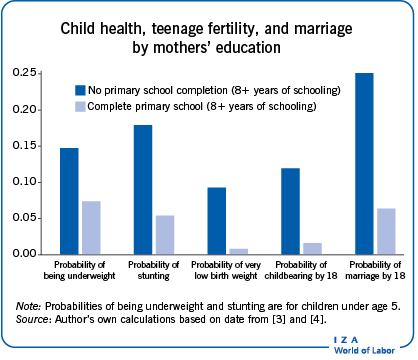Elevator pitch
There is a strong link between mothers’ primary school completion (8 or more years of schooling) and better socioeconomic outcomes, such as improved child health and reduced teenage fertility, but establishing causality is challenging. A 1997 compulsory schooling law in Turkey, which extended education from five to eight years, provides a natural experiment to identify causal effects. Empirical evidence suggests that increased female education from such reform significantly improves many socioeconomic outcomes of mothers and their children. While suggested mechanisms include changes in healthcare services utilization and risky pregnancy behaviors, such as smoking, thorough investigation of underlying channels is lacking.

Key findings
Pros
Compulsory schooling reforms such as in Turkey help identify the impact of female education on socioeconomic outcomes like child health and female empowerment.
Schooling reforms can significantly increase the likelihood of completing eight years of compulsory schooling for females, especially in rural areas.
Increased female education from schooling reforms can improve child and maternal health, and reduce teenage fertility and marriage.
Maternal education improves child health via preventive care and reduced smoking and lowers teenage fertility via modern contraceptive use.
Cons
The long-term effects of schooling policy are unexplored, so it is unclear if short-term effects will persist.
Existing evidence does not clarify the mechanisms linking female education to socioeconomic outcomes.
Mixed health outcome findings, partly due to data limitations, prevent policymakers from confirming education’s health benefits.
The effects on other important outcomes, such as mental health, cognitive skills, and poverty remain unexplored.